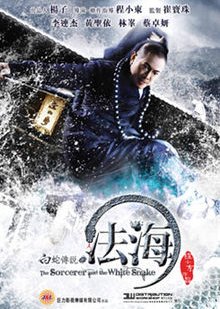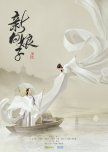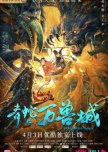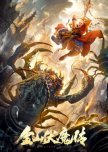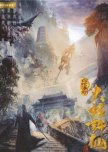
I felt this story had a nice moral and could be enjoyed by the whole family. And I've actually watched this movie twice, so I recommend you give it a try sit back and enjoy.
Cet avis était-il utile?
I am not a woman who needs to see romance in order to enjoy a movie/drama, but when romance is done right I understand why it's almost a must-have for so many. The couple in this film really pulled at my heartstrings. Despite their obvious differences, their love was so genuine and pure and their story moved me to tears. I loved this movie and I am so glad I just watched it instead of reading reviews that don't do it justice.
Cet avis était-il utile?
Cette critique peut contenir des spoilers
The tensions and polarities inherent in the basic 'original' plot challenge authors, scriptwriters, directors, etc., to exercise individual creativity in 'resolving' them from the perspectives of other characters (monk Fahai). They willy-nilly end up foregrounding meanings already framed by the core narrative. This may be easily demonstrated for several key themes in the "The Sorcerer and the White Snake" (SWS, 2011 movie):* Anamnesis and the kiss of life*: Fahai's first warning, for our benefit, to his apprentice Ning Ren is "Don't believe everything you see." We are plunged, on first snake encounter, deep into a mountain lake: when dark Xiaoqing frightens herb-gathering Xu Xian into falling in, her fair counterpart saves the drowning healer by forcibly kissing him. Applying mouth-to-mouth resuscitation, friends laugh at his traumatized hallucination (NDE?) of being revived by the unforgettable lips of a mystery woman. Smitten Bai Suzhen has Xiaoqing lure his boat to crash into the narrow wooden bridge connecting to her pavilion on West Lake. Protesting head-over-heels love for a salvific face he cannot recall, he rebuffs her advances, attempting to flee ashore. She starts severing the bridge, forcing him to walk backwards into her determined embrace. While he wonders who built this rickety island-pavilion that she insists is the most romantic vantage point to survey the charms West Lake. Noting his indebtedness for his life, the strange maiden laughingly drags him back down into her amniotic waters to be graced again with the unmistakeable rapture of that kiss that had transmitted the breath of life, bringing back his lost memory in a flash of 'recognition' (pratyabhijñā). Once consubstantial with the nourishing womb, the child remains (not just psychically) inhabited by the mother. Even without the Broken Bridge, the deeper meaning of the (consequent) consummation is made explicit through variant as commentary.
*Individuation through matricide* : In the pavilion, Xian had already intimated that she had not only given but "in a way" also taken his life. Fahai initially spared Bai, praising her selfless conduct, but warns her to abandon Xian and leave the human realm. When she protests her true love, the monk tells her to weep for both of them, instead of making him cry for her unilaterally imposed love. As its spiritual ascent peaks, the striving ego realizes that its own energies, including the desire for liberation, remain inescapably rooted in its demonic origin in the womb below. The only way for the individuated consciousness to cut loose is by surrendering the now purified ego, an inner death that amounts to deliberate matricide. Fahai confers his spirit dagger that is unwittingly used by his householder alter ego to mortally injure the monstrous reptile so fiercely defending their marriage against all odds. Incapable of harming her son-lover, the tearful snake plunges through the floorboards into West lake. The mortal healer, in this 'reversal' of roles, is now charged with resuscitating his self-sacrificing wife-mother. Just as the aspirant's spiritual ascent over several lives had been translated into white snake's ascesis over a thousand years, so too is her revival now equated to his rejuvenating (re-) descent into hell.
* Rejuvenation by robbing hell*: Even before the title screen, Fahai traps a vindictively seductive harpy, delegating disciple Neng Ren to confine her, with all other previously captured demons, at Leifeng Pagoda. Like elephant-trunked Hindu Gaṇeṣa stationed at the (spine's) root-foundation (mūlādhāra), the white serpent has a rat for companion, who divulges that the life-restoring root is to be found only at the base of the pagoda. However, this root is what keeps demons confined in hell, its theft releases them into the human world. More often hidden far away on Kun Lun mountain, at the South Pole, or in the highest heaven, the elixir (= soma) is won only by transgressing the Law. In LWS, thief Bai is being decapitated but the punishing sword is transformed into a garland by the Goddess of Mercy, who thus overrules the divine order. Just as Green's poison was transmuted by White into antidote (LWS), these same destructive energies rejuvenate under spiritual control. Fahai wraps the 'possessed' (āveśa) Xian in his own white upper garment before proceeding with collective exorcism back in Jinshan temple. Attacked by a demonic swarm of counterfeit roots that cling to his writhing body, the healer had set them and thereby himself on fire, leaving only the single true incombustible herb that the rat scurries away to revive the snake. Ultimately, it is the pure monk who is being consumed, through proxy, by the blazing fire of consciousness, fueled by the demoniac energies he has willfully unleashed.
*Enlightenment through regression*: Mortal combat against the primordial serpent becomes the cosmogonic canvas for depicting Fahai's liberating return to the womb. Possessed by demons, Xian is seated, while being exorcized, on the lap of a giant Buddha in the middle of the island-temple magically sealed off from the outside world. For the monk, it is the serpent that has cast a possessive spell now being undone. He warns the bewildered Bai that interrupting the exorcism ritual would result in Xian's death. Unable to defeat the powerful monk, the sisters unleash a towering flood to drown the entire chanting congregation, while rat-demons emerge from beneath the statue to break their magic circle. Repeatedly stung by White's deadly fangs, Fahai is devoured by Green, only to tear out of her belly and fall onto the frizzy crown of the submerged statue. Steeped in mystic trance (samādhi) to generate a fiery protective bubble that neutralizes their tsunami, he restores Leifeng pagoda, just pulverized by Bai, trapping her beneath. Triumphantly reborn and illumined, the now merciful Chan master, heeding Bai's appeal, strenuously lifts the tower for her to rush out for a desperate last embrace. Uncomprehending Xian, though deeply moved by her anguish, is again unable to recognize Bai—resigned to shedding copious tears on behalf of them both—until she kisses him. Immediately sucked back beneath the column, White reverts to her diminutive form of coiled serpent. The 'doomed' healer remains unscathed, for the "interruption" symbolically projects the process of the lone aspirant attaining enlightenment: "seeing is believing" only when our inner eye is able to pierce through the 'twilight language' of myth.
Transgressive sacrality & the demon-monk: In furthering his master's unrelenting crusade against evil, Neng Ren is bitten by the bat-demon king, whose poison begins disfiguring the human. With his increasingly grotesque external aspect, Neng Ren, too ashamed to face his former prey, is committing suicide when saved by the darker sister, who reveals her own sinister identity before taking it upon herself to teach him how to be a (good) demon. Xiaoqing fends for and nourishes this erstwhile devil-hunter to whom she was sexually attracted from the beginning, tempting the "sinner" with meat, blood, and her own pretty neck as offering. Curiously enough, Ren retains his essential human qualities, and does not feast on mortal flesh. Earlier, when asked why not befriend demons that are benign, he had responded that the master had only taught him to exorcise: she already observed then that his (master's) teacher has a problem. At the height of the tsunami, with his almost lifeless guru stretched out on the Buddha's crown, demon Ren rescues not only his belly-ripped companion Xiaoqing but also all his drowning fellow monastics. Unwilling to follow Bai's example of clinging to the every end, her alter ego slips back into the deep. Though Fahai eventually succeeds in confining Bai beneath the pagoda, his self-doubts culminate into (re-) accepting, as fellow traveler in his onward journey, his faithful disciple, who has already violated the three monastic taboos. The human Ren was earlier introducing himself, in the presence of a rather unamused Fahai, as his master's ordained successor. Their odd verbal exchange at the very beginning confirms it is himself that Fahai 'relegates' to confine the harpy. This retelling thus ends with Fahai at peace with his own inescapable and transgressive inner demon munching on the (elixir-) apple.
Driven by its ‘contradictory’ self-negating dynamic, LWS, like authentic tradition itself, keeps reproducing its perennial message through the innovative (re-) creativity of successive generations attentive to and respectful of its internal structure, however radical their reevaluations of themes, characters, events, etc., might appear at first sight.
[Above review is a single post in an ongoing blog (re-) interpreting the entire White Snake story narrative cycle by drawing on a variety of productions in different genres, ancient and modern.]
Cet avis était-il utile?

